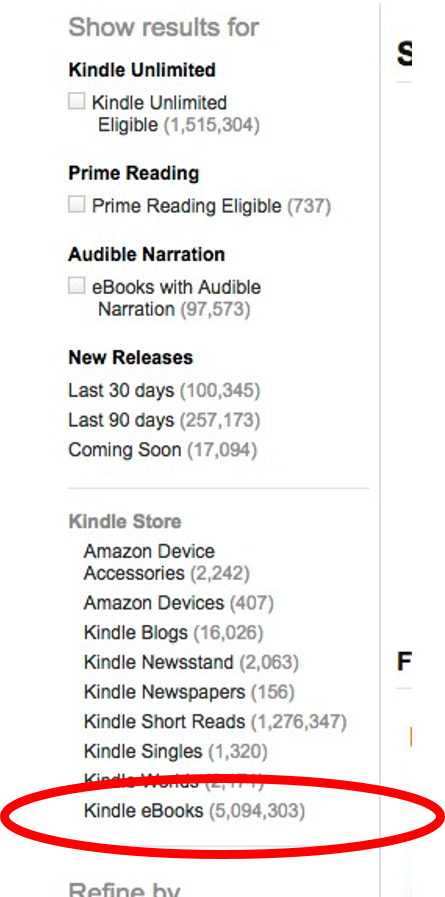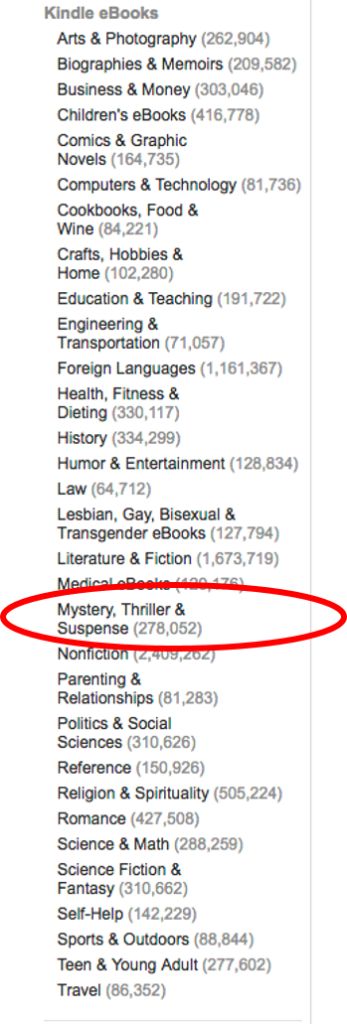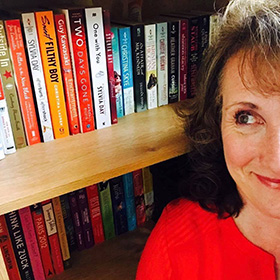If you’re an indie author, you’re also in the business of book marketing. Did you know that?
That’s the first thing you need to know about the publishing industry. Writing great books is only the first step – and with 4,500+ books published each day, getting readers is the hardest part.
Finding a way to set YOUR book apart from the pack isn’t always easy.
Luckily, I can tell you how to make it happen.
Amazon keywords
You may be surprised by how often Amazon keywords are weak. Or at least lacking the strength for optimal performance. By using them correctly, you can draw potential readers to your topic and, ultimately, sell more books.
But as with all tools – you must know how to use them correctly and effectively. And the “trick” here is understanding how you pull in buyers.
Have you heard of Frankincense Oil? No, this isn’t a Christmas quiz. It’s an essential oil that’s been popping up in studies as an effective alternative cancer treatment. It actually kills cancer cells. And more than 35% of all adults will be diagnosed with cancer at some point, so are you interested in learning more?
See what I did there? I likely got you to go from, “Did she forget the topic of this post?” to “I need to look this up.”
This concept, bringing together two ideas that aren’t obviously related and then using them to generate sales, is known as alignment. Granted the example I used touches on a very serious topic, but the same concept can be used across the board. That’s what your keywords can do for you when properly used.
But first, you need to figure out the problem that needs to be solved. And it may not be what you think!
Alignment in book marketing
Case study: Lyme Disease
I recently was performing an Amazon optimization for a book about managing Lyme Disease. Lyme Disease is a tough market, because it’s not a big one. Despite an increase in Lyme awareness, there aren’t a ton of Lyme Disease books on Amazon. And while reduced competition may sound great, in reality, especially Amazon reality, it’s not really. Because any books related to it have a high-numbered sales rank. And, the bigger the number, the lower the number of books sold.
As I was building recommendations for this author to improve her Amazon performance, it was not as worthwhile to use “Lyme Disease” as a target keyword. Instead, I dug deeper into the illness itself and discovered that it’s often mimics “other” issues. The laundry list includes thyroid problems, arthritis, and other ailments that are more frequent search terms. And so the solution? We presented the author with a set of Amazon keywords tying her book to those issues. Ultimately, this gets the book in front of readers looking for new ideas for managing their illnesses and/or symptoms.
Following this practice for just about any non-fiction book, we can boost the overall bounce of the book on Amazon.
This particular strategy is specific to non-fiction, and to make it effective, it’s critical that your book description matches this train of thought. In the Lyme Disease author’s case, I suggested she update the book description to include these other ailments. The idea here is that readers from a new audience will see the book and say: “Oh, I hadn’t considered that!” and, ultimately, purchase the book.
Case study: teen suicide
Now there are two things we Americans never like to talk about: death and money (especially whether or not we’ve saved enough for retirement). But I followed this same process with a book about teen bullying as it relates to teen suicide. And while, for obvious reasons, this author had put her book in the death/suicide category and used those keywords, her book wasn’t doing well. My suggestions to turn things around for her included a switch to the “teen health” category, which had very few competing titles in it that had great sales ranks.
Note: that’s the difference between low numbers in a category or keyword search. If you have low competition and a low sales rank (low means you’re selling a ton of books) that’s golden!
Additionally, I suggested that she remove all references to “death” and “suicide” from her Amazon keywords and instead focus on how parents might be interested in her message. New terms like “bullying” and “helping my teen” continue to prove far more popular.
Alignment and fiction
You can follow a similar path for your works of fiction too. And while it’s a tad less obvious, you can achieve this by tying your book to ideas that readers may be interested in – like paranormal elements, specific settings, or complex family relationships they can relate to.
Understanding Amazon’s Search
We’ve learned about alignment so far. But now it’s time to learn more about Amazon’s search function and how it has changed.
One of the first things you’ll want to do is find keywords to use on your KDP dashboard.
Start with a keyword search on the Kindle side of the Amazon website. Not every search is created equal. And searching “mystery and suspense” on the main Amazon site instead of digging down into the Kindle area specifically will net you very different (and largely inaccurate) results. Additionally, searching on the Kindle side of Amazon offers a much more accurate assessment of Amazon keywords. It also provides better data since so many books are only available in an eBook-only format.
So first select Kindle Store from the dropdown, leaving the search bar blank, and click the orange search button.

Next, click “Kindle eBooks.”

Next, select whatever genre you’re in, so for this test, let’s use “Mystery, Thriller & Suspense.”

Once you’re there, you’ll see this screen:

Right under your genre you’ll see more drop downs. I suggest picking one from this list. And, if appropriate, pick one that isn’t too packed with books. So that might be Crime Fiction or Suspense. Again, you’ll want to make sure that your book fits into this segment of your genre.
Once you’re there just start typing in your keywords into the search bar. As you start to do this Amazon’s intuitive search will begin to drop down suggestions. Now, not every suggestion will be a good one that you’ll want to use. However, this gives you a great place to start.

Amazon keyword guidelines
As you refine your keywords, you’ll want your keyword string to follow these guidelines:
- Use multiple words, a “keyword string.” Consumers don’t search using single keywords. (Hint: Think about how you might Google your book – you wouldn’t search with just the word “suspense” there either.)
- Don’t assume Amazon’s recommendations (such as those from the above screenshot) are the exact right ones for your book. We’ll go over that in a minute.
- As you see Amazon’s suggestions, be sure to visit those pages to see what kind of books are in the results AND their sales rank. If you are using a keyword string with a very high sales rank, it means that not a lot of people are actually searching on that particular string. (Again, remember here, the lower the number, the better. A book ranking 15,000 is performing much better than a book ranking 1,500,000.)
- The other thing to be careful of is if there are a lot of free books cluttering the first page of this keyword string search. When you look at “suspense mystery books” you’ll see lots of books on free promotion; these will always top the list. Ignore their rank, because it doesn’t give you an accurate idea of how this string of Amazon keywords is actually performing. Instead keep going down the list until you find a book that isn’t on a pricing promo.
- Kindle Unlimited books don’t matter, so don’t worry if the entire search string brings up Kindle Unlimited titles; they won’t affect your results.
I know this is a lot of information to consider but think of this project as a fun challenge. Strike that, a challenge that can make you more money! Sounds better by the second, right?
The best part is there’s no limit to how often you can update your Amazon keywords.
Do this once a quarter or so. What people search for in the spring is entirely different than summer, fall, and winter, especially with changing holidays. Plus, Amazon periodically comes up with new categories that you’ll want to be aware of. And as a bonus, since you’re already logged in, you can add any new review blurbs that you want to feature, or set up a discount promotion with KDP.
All this hard work should also fuel some great marketing angles that you can utilize in other areas like social media (Facebook, Twitter, Goodreads, and more!), or blog post topics! Good luck! I’d love to hear how it goes!
Want some help with this?
We can help! Keywords and categories on Amazon are always changing, luckily for you we’re on top of it. Read more about recent changes here, and then check out our Amazon Optimization Package! And be sure to sign up for our newsletter to get exclusive discounts!
Resources and Downloads





Having recently started getting to grips properly with Google Adwords, it is clear that keywords are hugely important in a number of areas. Using them like you suggest on Amazon KDP is something I’ve not really tried, so thank you for a great post.
Thank you for reading! Glad you liked it!
Hello, I’m so glad I stumbled across your site. But I tried searching for keywords on Amazon as described, the categories show up but not how many books are in any category. Do you think something is wrong with my Amazon account? Any advice or solutions are very welcome! Thanks, Michelle
Hi Michelle! Check out this recent post that talks about categories. It should help you refine further and give you some really solid pointers. Please let me know how this works out for you!
I just read the following post: Amazon Keywords That Pull In More Buyers
https://amarketingexpert.com/amazon-keywords-more-buyers/
May 11, 2017 by Penny Sansevieri 14 Comments
The numbers did not appear next to the selections. Am I doing something wrong or has Amazon changed their website?
Hi John, thanks for reading! Amazon is constantly changing the information that they display. After you choose the last filter, the number of books will be displayed in the top left.